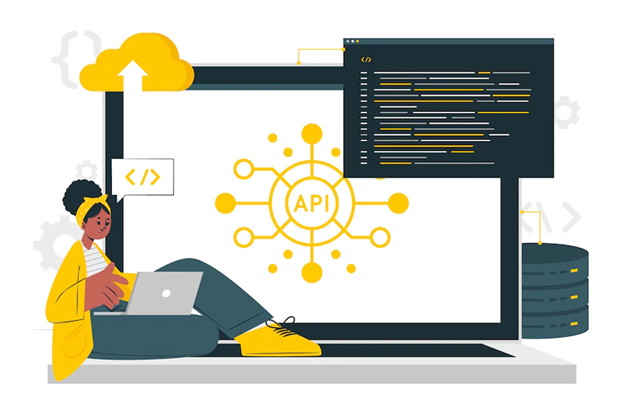Top 7 API Integration Tools To Use In 2022
API Integration
API Integration
API integration is the process of connecting two or more applications using API (Application Programming Interface). API acts as a bridge between different applications and allows them to share data and functionality. The API integration can be used to connect a wide variety of applications, including web-based, mobile, and desktop applications.

What is an API integration tool?
API integration tool is any software that enables two or more disparate systems to communicate with each other. API stands for an application programming interface. API integration allows different applications to share data and functionality, making it possible for them to work together.
There are a number of reasons why you might want to integrate API into your business applications. The API integration can help you:
• Connect your disparate systems and data
• Improve efficiency by automating tasks
• Reduce costs by eliminating manual work
• Increase customer satisfaction by providing a better user experience
Now that we know what API integration is and why you might want to use it, let’s take a look at seven of the most popular API integration tools.
1. MuleSoft Anypoint Platform
MuleSoft’s Anypoint Platform is a popular choice for API integration. It offers a wide range of features, including a drag-and-drop interface, pre-built connectors, and comprehensive API management capabilities. Anypoint Platform also has a strong community support network.
2. Dell Boomi AtomSphere
Dell Boomi AtomSphere is another popular API integration tool. It offers a wide range of connectors and a user-friendly interface. AtomSphere also has comprehensive API management capabilities and can be used to create both RESTful and SOAP-based APIs.
3. IBM App Connect
IBM’s App Connect is a powerful API integration tool that offers a wide range of features, including pre-built connectors, a drag-and-drop interface, and comprehensive API management capabilities. App Connect also integrates with a number of popular third-party applications, such as Salesforce, Twitter, and Facebook.
4. Microsoft Azure API Management
Microsoft’s Azure API Management is a cloud-based API management solution that offers a wide range of features, including API gateway capabilities, rate limiting, and security. Azure API Management also integrates with a number of popular third-party applications, such as Salesforce, Twitter, and Facebook.
5. Amazon API Gateway
Amazon’s API Gateway is a cloud-based API management solution that offers a number of features, including API gateway capabilities, security, and scalability. Amazon API Gateway also integrates with a number of popular AWS services, such as Lambda, S3, and DynamoDB.
6. Google Cloud Platform
Google’s Cloud Platform is a cloud-based API management solution that offers a number of features, including API gateway capabilities, security, and scalability. Google Cloud Platform also integrates with a number of popular Google services, such as Gmail, Drive, and Calendar.
7. Kong
Kong is an open-source API management solution that offers a number of features, including API gateway capabilities, security, and plugins. Kong also integrates with a number of popular third-party applications, such as Salesforce, Twitter, and Facebook.
API integration is a complex process, and there is no one-size-fits-all solution. The best API integration tool for your needs will depend on a number of factors, including the nature of your data, the applications you are integrating with, and your budget.
How To Improve Your Business Through API Integration?
Now that we know what API integration is, let’s take a look at how you can use it to improve your business.
1. Connect Your Disparate Systems
One of the main benefits of API integration is that it allows you to connect your disparate systems and data. By integrating your various applications and data sources, you can streamline your processes and improve efficiency.
2. Automate Tasks
Another benefit of API integration is that it can help you automate tasks. By integrating your applications with API, you can eliminate the need for manual work, which can save you time and money.
3. Reduce Costs
API integration can also help you reduce costs. By integrating your applications, you can avoid the need to duplicate data and processes. This can lead to significant cost savings.
4. Improve Customer Service
API integration can also help you improve customer service. By integrating your customer-facing applications with your back-end systems, you can provide a more seamless experience for your customers. This can lead to increased customer satisfaction and loyalty.
5. Increase Revenue
Finally, API integration can help you increase revenue. By integrating your applications with third-party data sources, you can provide valuable data to your customers. This data can be used to make better decisions about products, pricing, and marketing. Ultimately, this can lead to increased sales and revenue.
What Are The Challenges Of API Integration?
While API integration offers many benefits, it also comes with some challenges. Here are some of the challenges you may face when integrating API into your business:
1. API Integration Is Complex
API integration is a complex process. There are many moving parts, and things can quickly get complicated. This complexity can lead to errors and problems down the road.
2. API Integration Requires Expertise
Another challenge of API integration is that it requires expertise. API integration is not something you can do on your own. You will need to hire experts to help you with the process.
3. API Integration Can Be Expensive
API integration can also be expensive. The costs of API integration can quickly add up, especially if you’re working with multiple data sources.
4. API Integration Can Be Time-Consuming
API integration can also be time-consuming. The process of integrating API can take weeks or even months to complete.
Despite these challenges, API integration is a powerful tool that can help you improve your business. If you’re willing to invest the time and resources, API integration can be a great way to take your business to the next level.
What Is The Future Of API Integration?
The future of API integration is bright. As the world becomes more connected, API integration will become more important. More and more businesses are waking up to the benefits of API integration, and the market is expected to grow rapidly in the coming years.
According to a recent report by Grand View Research, the API integration market is expected to reach $21.3 billion by 2025. This growth is being driven by the increasing adoption of cloud-based applications and the need for better data management.
As API integration becomes more popular, we can expect to see more API integration tools and services. This will make API integration easier and more accessible for businesses of all sizes.
So, if you’re looking to improve your business, API integration is a great option. With the help of experts, you can overcome the challenges and reap the benefits of API integration. API integration is the future of business, and there’s no time like the present to get started.

Looking to improve your business with API integration? Contact API Guy today for expert help.

